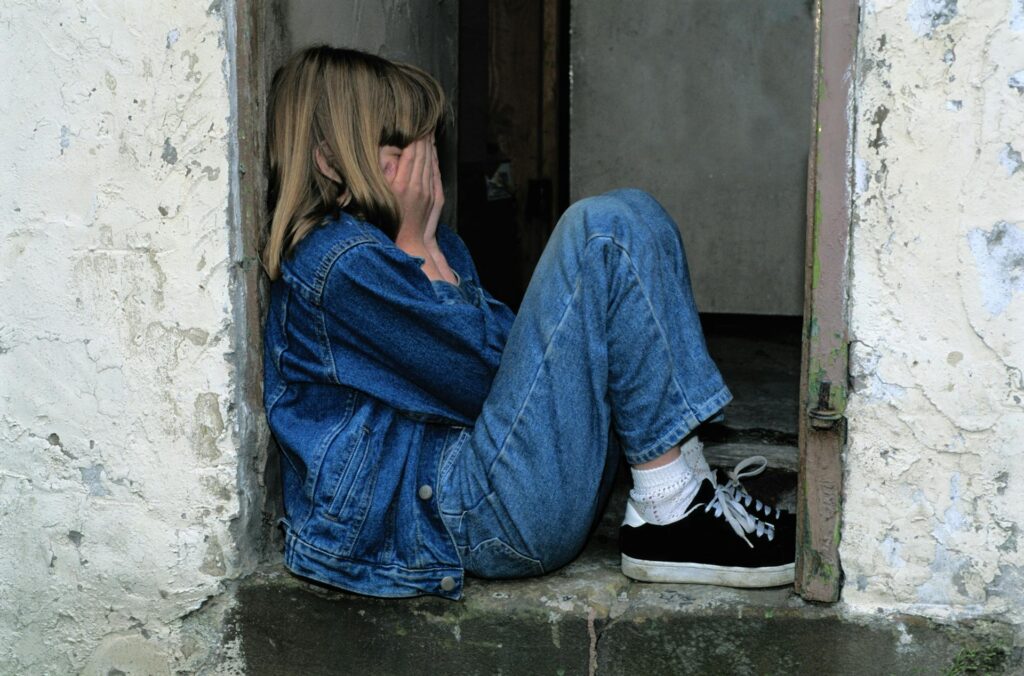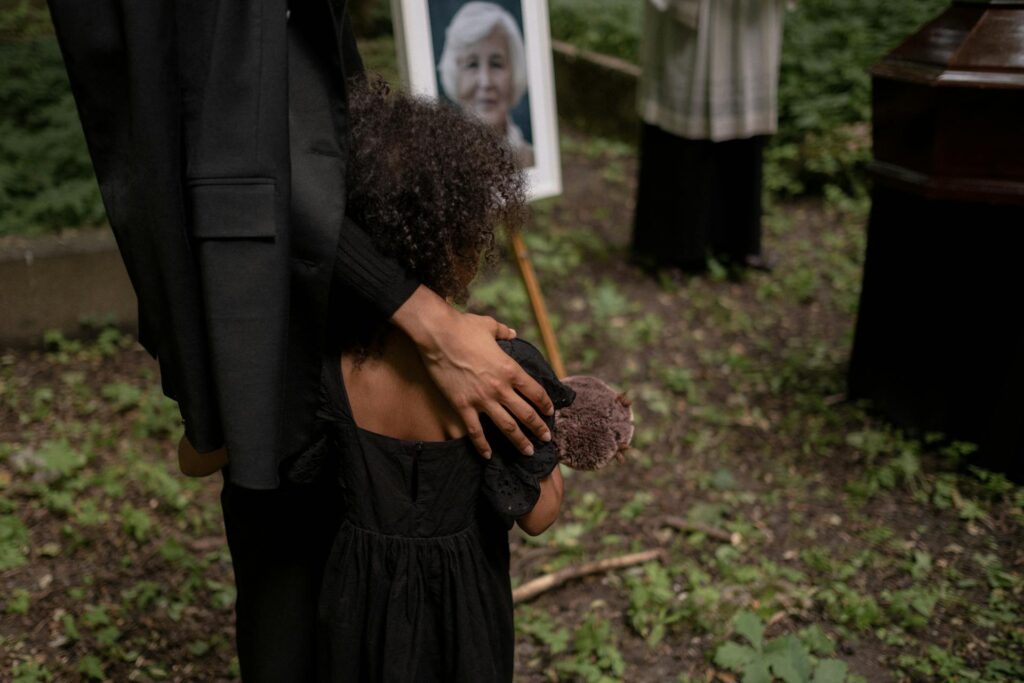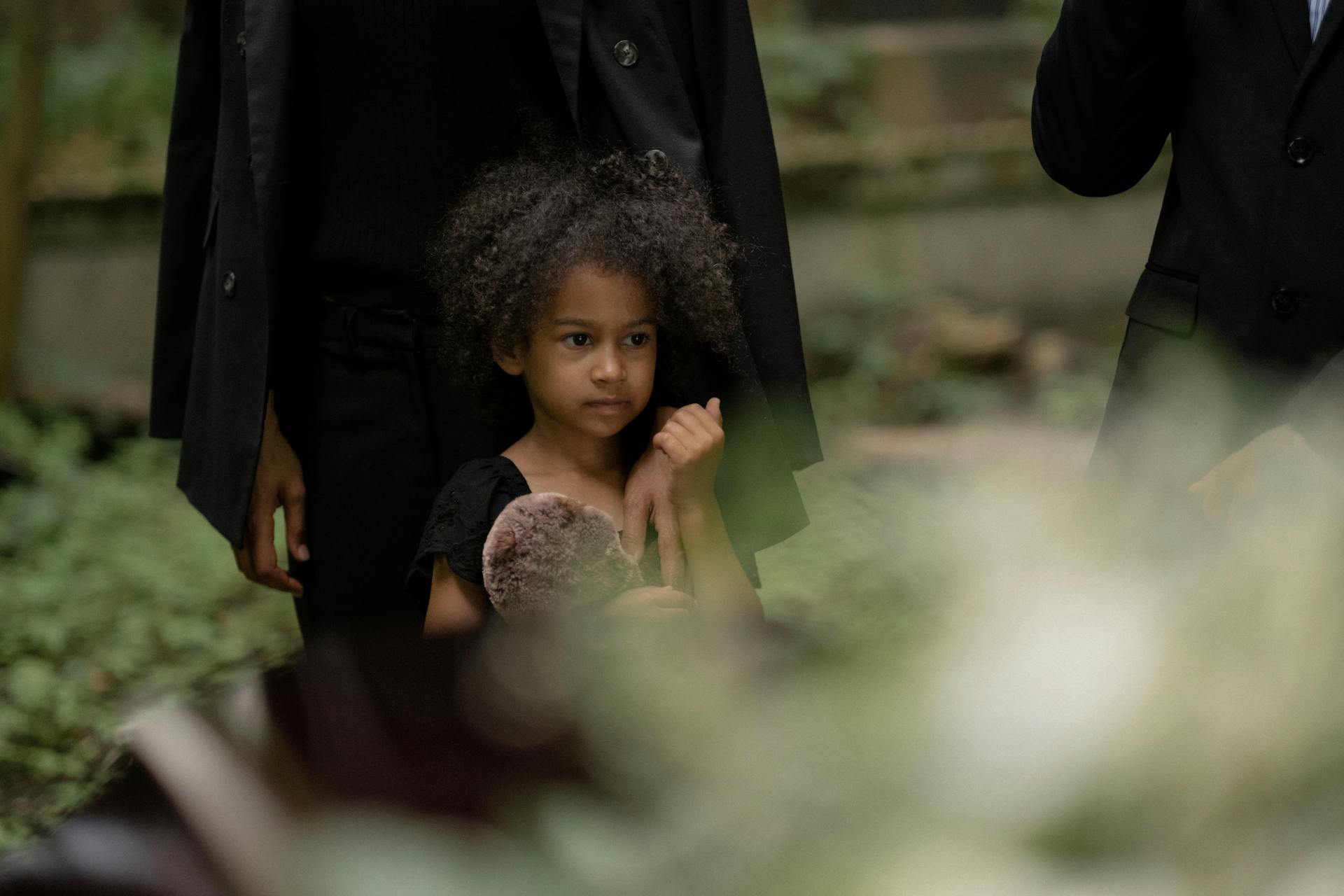There’s a common idea that kids don’t understand death and/or that they need to be protected from it until they are “old enough.” Yet, young children are constantly exposed to death, whether it’s from a loved one or pet dying, fiction that deals with death, or walking into the room when somebody on the TV is discussing the passing of a celebrity or worse.
Stop lying to your children about death. Here’s why: Telling white lies about or sugarcoating death might seem to make your child happy in the short run, but in the long term it will help support your child’s mental health. These conversations are awkward…nobody likes talking about death…but it helps children express their feelings and learn. Talking about death before a family member passes can also help your child deal with it better. They will learn that it’s okay to be open about their feelings and grief, even if those feelings are more complicated. Death is a natural part of life, and it’s important not to shield children from this reality.
It’s true that it is hard to explain death to children, but avoiding the topic can teach your child to repress these feelings and sit on them, which can cause them to turn into anger. It can make it harder for them to be honest with others. It can also help them avoid unhealthy patterns such as being afraid of hospitals because that is where people go to die. Learning how to talk to kids about death and how to tell kids about death is an important part of being a good parent. A lot of people fear death, but that doesn’t mean it doesn’t exist. Children need to understand that all living things eventually die.
Do Children Understand Death?
The short answer is: A lot more than you think. The longer answer is, of course, that it depends on their age and developmental stage. Every child is different, and some children may be ahead of or behind these stages. But a 4 year old asking about death is different from a 6 year old talking about death.
But here is an overview of how children appear to understand death:
Under Two
Babies don’t understand that somebody has died, only that something has changed. If the death is that of a caregiver, then the inevitable changes will cause anxiety and distress. At eight months they may be capable of missing somebody and start looking for them. They will also pick up on the grief of family members.
Two to Five
Two to five year olds develop a curiosity about the cause of death, but struggle to grasp its permanence. If you tell them a pet was put to sleep, they are likely to ask when it will wake up. Avoiding euphemistic language can help them develop more of an understanding.
Preschoolers may expect the person to return and may need reassurance that dead people don’t feel pain, especially if attending a funeral.
Five to Seven
Children develop awareness of the finality of death and may have to reprocess losses that occured earlier in life. They may feel guilty or think they can bring the person back. They also start to become aware that death is inevitable and start to worry about other people. They begin to develop a sense of their own mortality and that’s how the fear of death occurs. If you notice your 6 year old talking about death, don’t interrupt them. Instead, listen to their thoughts and answer their questions.
Again, every child is different, and their reactions are shaped by their personality and by their circumstances. This includes how old they are when they first lose a family member…and this includes pets. A child who finds the body of a pet in its cage may develop a very different understanding of death from one who is not as directly exposed to it. You need to be ready to have these tough conversations at any time.
Also note that religion does not directly map to a child’s understanding of biological death. Studies have found few differences in the development of understanding in children raised in different belief systems. Rather, the spiritual understanding of God and death is separate and tends to develop later.

The Concept of Death in Early Childhood
Young children tend to pass through a phase of believing two very incorrect things about death. That’s why it’s important to be prepared and know how to talk to kids about death.
The first is reversibility. Euphemisms such as “dirt naps” and cartoon depictions of death actually encourage this phase. The child finds it hard to believe that the person has in fact passed away. A 4 year old asking about death is likely to ask when the person will be getting better or coming home. They may be further confused by religious beliefs that imply the person is simply living somewhere else…and of course they can come back.
The second is magical thinking. At a young age, children may think they somehow caused the person’s death, especially if it happened soon after a fight or conflict. Like adults, children sometimes have negative thoughts about the people they love, but young children can think those thoughts actually have an impact on life. (They may also, for example, believe that if they think hard enough they can control the eather).
Both of these are normal phases to pass through and should be treated delicately. Introducing children to fiction that shows death more realistically can help, but should be done appropriately and with an adult ready to answer all of those questions about Bambi’s mother. Knowing how to react can make talking to kids about death easier.
Recognizing Signs of Understanding
Given every child is different, how do you know what your child does understand about death?
In very young children, grief and distress may manifest as clinginess and, in babies, inconsolable crying. This doesn’t show any real understanding, but when your child starts looking for the dead person, you know they are missing them specifically.
In slightly older children, expect them to start asking questions about death, especially as they start to move from cartoons to more realistic fiction. In many cartoons, death is extremely temporary (and even humorous). They may ask if dead people can get better, or where they go. Some children might ask about why death happens and how it “works.”
Some children might attempt to understand death by bringing home the corpses of wild animals. This morbid behavior is a way to try and understand the world and while it should not be encouraged for obvious reasons, try not to react badly.
Anxiety about hospitals and trips can show a false understanding of death. When talking to kids about death, avoid the use of euphemisms such as “gone away” as it can make kids scared of road trips. Explaind death to children with clear language. As children grasp the finality of death they may start worrying about the safety of others, which can particularly manifest with pets they are partly responsible for. They may start to be afraid they will kill the hamster, and may need some reassurance on this front.
👉 During times of grief, children may exhibit attention-seeking behaviors. Learn more about this in our article: ‘Understanding and Managing Attention Seeking Behavior in Children: Top 5 Effective Strategies‘.
Should You Be Honest With Kids About Death?
Again, the short answer is “Yes.” Experts say that euphemisms should not be used with young children as rather than making them feel better, they cause confusion and anxiety.
Studies show that parents who are honest and open when communicating about death raise children with a better and more sophisticated understanding of death. There’s also a correlation between parental anxiety about death and a lack of effective communication. It can be very hard to talk about death, especially if you (like most of us) were raised to see it as a taboo and something that should be talked about only indirectly. It also used to be believed that children could not really understand death until about 10, and some parents use that to avoid talking about it with younger children.
Parents tend, in fact, to underestimate their child’s understanding of death.
Additionally, many parents avoid talking about death until somebody dies. This can make a child’s first exposure to the death of a loved one particularly hard and challenging. Proactively communicating about death can make dealing with, for example, the passing of grandma a lot easier for a child.
Building Trust Through Honesty
Lying to a child about death doesn’t just impact their understand of it. It can also impact their trust in you. Some people will protect children from death by, for example, telling them that Timmy the dog is now living with another family (or, even worse, replacing Timmy with an identical dog and pretending nothing happened). If the child ever finds out, this can permanently dent their trust in their caregivers and even cause conflict as an adult.
Honesty about death, especially if you are anxious about it, can build trust and help your child see their parents as more human and vulnerable. Dishonesty, especially if it goes all the way to lying, can damage your relationship in the long term.
Children do not like being lied to, and may actually find being lied to “for their own good” worse than other kinds of lies due to how patronizing it is. They may notice that their parents think they don’t understand and that too can induce some anger.
Providing Age-Appropriate Information
While you should be honest about death and not sugarcoat it, you also need to make sure the information you provide is appropriate for the young person.
Many parents do indeed underestimate how much their kids understand, particularly about the causality of death. Kids are also very likely to ask questions about this. “Why did Aunt Agatha die?” is a common question…and should be answered honestly, but in as simple language as possible.
Bear in mind that mainstream media can show unrealistic depictions of death. Age appropriate media often shows death as reversible, grief as something you get over right away (or that doesn’t exist). When your children watch these shows or movies, have conversations with them about unrealistic portrayals, reminding them that fiction is not reality. There are also age appropriate books about death for kids that you can get them.
Children under two really don’t understand death…but may appreciate photos of themselves with the loved one, and may want stories about them so they feel as if they knew them. If you do talk to them, though, be direct and honest.
With older children, always use concrete language and don’t be afraid of the word “died.” When they ask about biological processes, use the same language you would use if they are asking about how a flower grows. Keep it simple, and keep it accurate. Use dead plants, bugs, or animals to expose them to the concept and as a starting point for discussion. It’s easier for children to confront death when it’s a creature they have no emotional connection to, such as a dead hatchling that fell out of the nest. Talk about what happened to the animal and why.
Answer all questions your child might have, even if they make you uncomfortable.

How Can Caregivers Help A Grieving Child After Losing A Loved One
Grief, in children, may manifest slightly differently from grief in adults. However, they will also show similar behavior, such as looking for the person (which can be seen in babies as young as eight month), bouts of crying, etc.
They may alternate between crying and playing happily. The play may be a defense mechanism. They may also be angry at the person for dying, angry at themselves (especially if they think their thoughts caused it), guilty in general. Very young children may actually regress to baby talk, wet the bed, suck their thumb, etc.
Younger kids may become exceptionally well behaved because they think being good will bring the person back.
1. Create a Safe Space for Expression
Older children may doodle or write about death, and it’s important to let them as this is a helpful outlet for their feelings. If they are in school, make sure that teachers know there was a death in the family so they don’t think something else is going on. If school is not safe, which is unfortunately often the case, encourage the child to express their feelings and emotions in other ways. Make sure they know they have a space to express their own feelings.
2. Offer Support and Reassurance
Respect your child’s needs. Children may or may not want to attend the funeral. Let them choose. Some children find funerals provide the same helpful closure as adults. Others may find them overwhelming. If your child does decide to attend, explain to them what happens at funerals, make sure they know people will cry. If it’s open casket, you may need to have a conversation about corpses and bodies. Note that some kids may want to do a funeral for a deceased pet.
Don’t immediately replace dead pets, let them have time to grieve, and consider replacing the pet with an animal that is very different in breed, color, personality, or even species so that it doesn’t give them the idea people are replacable.
Let your child see your own grief so they know it’s normal while reassuring them that life will go on. Lastly, consider age appropriate grief therapy, especially if the death is a parent or sibling. If you are wondering what not to say to kids about death… well, anything confusing.
Stop Lying to Your Children About Death. Here’s why: The Psychological Effects
We’ve already discussed it to some degree, but lying about death can have long-term implications.
Impact on Trust and Emotional Development
It can damage or even destroy your child’s trust in you as a source of information and can result in a poor relationship as adults.
It can also result in an unhealthy relationship with death that can then become generational. You may already be part of that cycle with your own parents, and it can be challenging to break it, but it’s important. Children need to grow up with a healthy understanding of death so they can better process grief.
👉 Struggling to help your child manage anger? Discover effective strategies in our article: ‘How to Help Your Child Navigate Emotions: Effective Anger Management for Kids’.
Uncertainty and Confusion
Dishonesty and euphemisms can cause uncertainty and confusion. Children may not understand that the dead person is not coming back, meaning they don’t have closure and may have more anxiety. Children are going to be distressed if somebody dies, but they need to know this distress is normal and have the difficult conversations that help them mature. Knowing what not to say to kids about death can help reduce this confusion.

Conclusion
Talking to your children about death is not easy. The first time your child loses a loved one, it will be difficult for both of you. You need to be honest and open, even if your own family culture was not that way. Avoid euphemisms, answer all of your child’s questions, buy books about death for kids, and allow them to grieve in their own way. Always approach conversations with empathy and understanding and let them see your own sorrow. This will help you support your child through the grieving process and raise a child who understands death and is less anxious about it.
Struggling to communicate effectively with your child? We’re here to help! Join our parenting classs ‘How to Talk so Kids Will Listen: 3 Proven Methods’ and improve your parenting skills.
You don’t know how to talk to kids about death? Have a chat with Sophie, our intelligent AI assistent, for helpful suggestions and guidance.
References
Buccheri, T., Musaad, S., Kelly K. Bost, K., Fiese, B. (2018). Development and assessment of stressful life events subscales – A preliminary analysis. Journal of Affective Disorders. 226. 178-187. https://doi.org/10.1016/j.jad.2017.09.046.s
Children’s understanding of death at different ages. (n.d.). Child Bereavement UK. https://www.childbereavementuk.org/childrens-understanding-of-death-at-different-ages
Ehmke, R. (2016, January 29). Helping Children Deal With Grief. Child Mind Institute. https://childmind.org/article/helping-children-deal-grief/
Longbottom, S., & Slaughter, V. (2018). Sources of children’s knowledge about death and dying. Philosophical Transactions of the Royal Society B: Biological Sciences, 373(1754), 20170267. https://doi.org/10.1098/rstb.2017.0267










